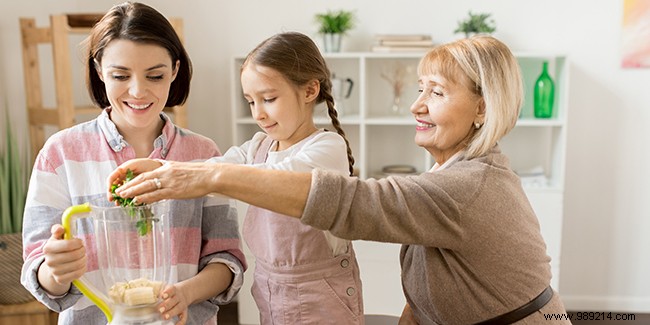
A very rhythmic way of life and sometimes very large geographical distances between members of the same family have led to a break-up of the family circle. It is then more difficult to exercise intergenerational solidarity, between the youngest and oldest members of the family.
Seniors have more difficulty finding their place and many suffer from isolation. However, there are many ideas for activities to be practiced between generations when you are retired, and which bring for the older ones self-esteem and usefulness and, for the younger ones, cultural enrichment
Within the same family, the elders have a role of guide or adviser to play for the younger generations. They are also the guardians of traditions and family values. When you're retired and you have more time, it's the best time to reconnect with the younger ones. These exchanges can be favored during various activities.
If you are lucky as grandparents to come from a region, a region or a country with strong culinary traditions, for example, why not organize a cooking workshop with the youngest of your family? where you will have the opportunity to pass on basic recipes and tricks passed down from generation to generation.
As with cooking, if you know traditional songs and dances from a region or country, your grandchildren or great-grandchildren will be happy to participate in a fun time with you while learning them. They will also be able to show you and teach you in turn the latest fashionable choreographies for their generation! This will be an opportunity for you to pass on your knowledge, so that it does not get lost, on the one hand, and on the other hand by having a friendly and festive time.
The youngest in a family are often fond of knowing the details of the lives of their elders. This is an opportunity for seniors to sometimes reveal a few secrets about their past life but also to link it with historical facts.
Intergenerational solidarity can also be the youngest who pass on their know-how. Born with the Internet and the development of new technologies, you can contact them and organize one or more workshops with them so that they teach you how to use and master a computer, a tablet or a mobile phone, for example.
While intergenerational solidarity within the family circle is more difficult to establish, often for reasons of distance but also of time, it is increasingly put forward within society thanks to associations, education, institutions for the elderly, etc. All these institutions organize and develop exchange activities between generations. Let's cite some examples.
Older people have more time in retirement and one of their favorite hobbies is gardening. Associations or local authorities create community gardens where old and young generations rub shoulders. These young people, often urban and far from these works of the land, learn the good gestures and the rudiments of gardening thanks to the experience of the older ones.
Offering help to help a child with their homework is a good way for a retired senior to feel useful and to pass on their knowledge. It is also a wonderful handover for the young person concerned who benefits not only from the experience of an elder but also from his patience, often much greater than that of parents who are still active.